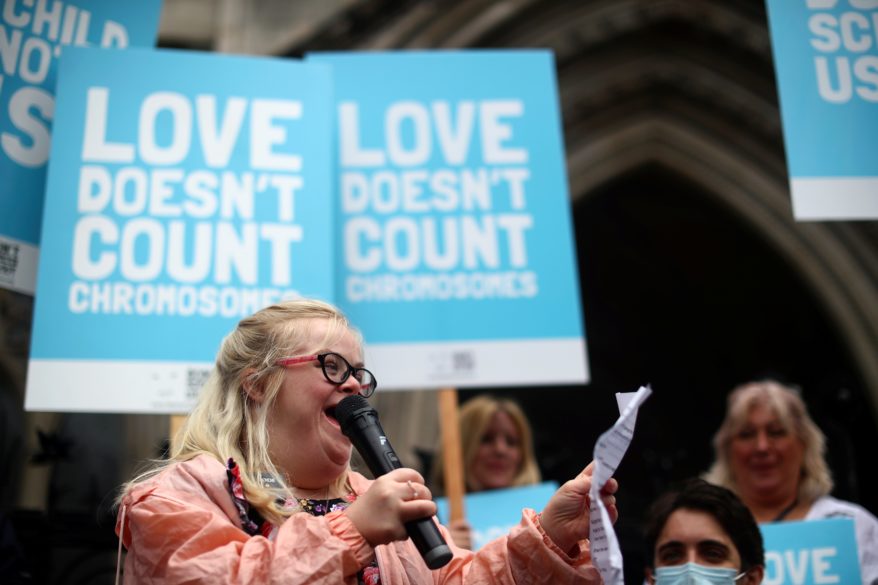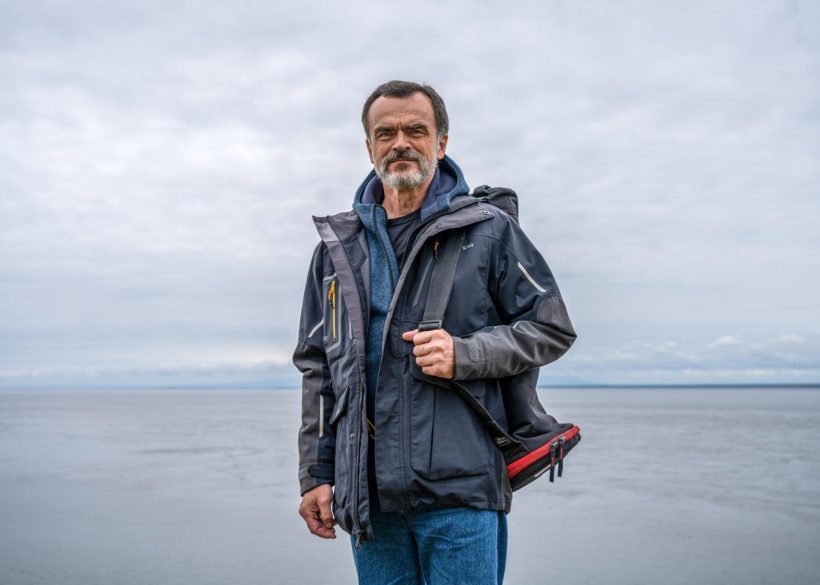NATION
WASHINGTON (CNS) – In a 218-211 vote Sept. 24, the U.S. House passed what opponents consider one of the most extreme abortion bills ever seen in the nation – the Women’s Health Protection Act. “This bill is far outside the American mainstream and goes far beyond Roe v Wade,” Rep. Chris Smith, R-N.J., co-chairman of the. Congressional Pro-Life Caucus, said in remarks ahead of the vote. “This bill constitutes an existential threat to unborn children and to the value of life itself.” H.R. 3755 codifies the U.S. Supreme Court’s 1973 Roe v. Wade decision legalizing abortion nationwide. The measure establishes the legal right to abortion on demand at any stage of pregnancy in all 50 states under federal law. “This deceptively-named bill is the most extreme pro-abortion bill our nation has ever seen,” Archbishop Joseph F. Naumann of Kansas City, Kansas, chairman of the U.S. bishops’ pro-life committee, said Sept. 24. If it became law, “it would lead to the deliberate destruction of millions of unborn lives, leaving countless women with physical, emotional and spiritual scars,” he said in a statement. “As a nation built on the recognition that every human being is endowed by its Creator with the unalienable rights to life, liberty and the pursuit of happiness, this bill is a complete injustice.”

WASHINGTON (CNS) – Panelists at one Sept. 27 forum during an online conference on immigration law and policy noted that the asylum process, like much else in the U.S. immigration system, is in need of its own fixes. The percentage of those who fear being returned to their country of origin has leaped in a 12-year period, from 5% in 2007 to 43% in 2019, according to Ted H. Kim, acting associate director of the Refugee, Asylum and International Operations Directorate, or RAIO, which is a division of U.S. Citizenship and Immigration Services. The period from 2016 to 2018, when Kim started working at USCIS, “saw really high numbers at the border, and 46% of those at the border consisted of family units,” he added. That does not take into account “unaccompanied children, trafficking victims, who must be transferred to HHS (Health and Human Services) custody within 72 hours,” Kim said, “or the entire system risks being backed up ,including as recently as this past year.” A statute calling for “expedited removal” of immigrants was passed in 1996, but that was “designed for a different era when we did not see these huge numbers of arrivals at the border like we do today,” Kim said at the forum, sponsored by the Catholic Legal Immigration Network and co-sponsored by the Georgetown University Law School and the Migration Policy Institute. “This has led to a backlog which is quickly approaching the program’s all-time high in the late ‘90s.” He added, “Too often, we’re on our heels in a reactive mode.”
CHICAGO (CNS) – Father Stan Jaszek, a missionary priest from Poland who is serving Native Alaskans in the Diocese of Fairbanks, has been named the recipient of Catholic Extension’s 2021-2022 Lumen Christi Award. The Lumen Christi Award, established in 1978, is the highest honor given by Catholic Extension and goes to people “who radiate and reveal the light of Christ present in the communities where they serve.” “Father Stan intuitively understands that the church can be a force of positive transformation having grown up in communist Poland and witnessing the impact of (St.) John Paul II and the Solidarity movement,” said Father Jack Wall, president of Catholic Extension. “That conviction is what took him as a missionary priest from Poland to Peru early in his priesthood, then later from post-apartheid Africa to Alaska, in the

Diocese of Fairbanks where he has faithfully served nearly two decades,” the priest said in a Sept. 28 statement. Father Jaszek currently serves the Native Alaskan villages of the remote Yukon-Kuskokwim Delta region, along the coast of the Bering Sea. Out of his 19 years of missionary work in the Diocese of Fairbanks, Father Jaszek has spent 14 of them living among the Yup’ik people. He is one of just a handful of priests ministering in the Fairbanks Diocese, which geographically is the largest U.S. diocese.
VATICAN
VATICAN CITY (CNS) – The Vatican announced that Pope Francis will formally launch the process of the Synod of Bishops with a Mass in St. Peter’s Basilica. The Oct. 10 Mass, which officially open the synodal process, will be preceded by a day of reflection in the synod hall, the Vatican said in a statement published Oct. 1. The Oct. 9 day of reflection, the statement said, will include “representatives of the people God, including delegates of the bishops’ conferences and related bodies, members of the Roman Curia, fraternal delegates, delegates of consecrated life and ecclesial lay movements, the youth council, etc.” According to the schedule released by the Vatican, the day of reflection will begin with a meditation followed by an address by Pope Francis. It will also feature testimonies by people present at the synod hall, including a young woman from South Africa, a bishop from South Korea, and the head of a religious community from France. Participants will also listen to video testimonies from a nun in the United States, a family in Australia and a priest in Brazil.
VATICAN CITY (CNS) – Death row inmates in Florida’s prisons refer to their 6-foot-by-9-foot cell as their “house,” with some having lived in their “house” for 40 years – longer than one Catholic lay chaplain said he has lived in his family home in Tallahassee. So when Dale Recinella, the lay minister, goes from cell to cell to offer pastoral care, religious education and spiritual accompaniment, “we go house to house, cell to cell, and that’s where we meet them.” These are men and women who cannot come out, “they can’t even come to the chapel,” so the church must go to them. Recinella has been serving as a Catholic correctional chaplain for inmates on death row and in solitary confinement on behalf of the Catholic bishops of Florida for decades. With just a few more months until his 70th birthday, Recinella was at the Vatican to be honored by the Pontifical Academy for Life and receive its first ever Guardian of Life Award during a special evening event Sept. 28. The academy was holding its general assembly onsite in Rome and online Sept. 27-29. Recinella told Catholic News Service Sept. 28 that, as he has moved on to “semi-retirement,” the church in Florida is working to make sure that this ministry continues “in a very vibrant and active way” by finding dedicated people to follow in his footsteps.
WORLD
LONDON (CNS) – Two women who challenged the U.K. government over a law that allows abortion up to birth for disabled babies have vowed to take their case to appeal after it was dismissed by the High Court. Heidi Crowter, 26, who has Down syndrome, and Máire Lea-Wilson, whose 2-year-old son Aidan also has the condition, objected to a clause in the 1967 Abortion Act that extended the right to abortion beyond the 24-week upper limit when fetuses have disabilities. They claimed the law breached the European Convention on Human Rights because it discriminated against disabled children, and they sought to have the clause removed from the act. They made their case in a two-day hearing in July and learned Sept. 23 that their attempt had failed when the High Court ruled that the clause was not unlawful. Afterward, Crowter said she would seek permission to take the case to the Court of Appeal. “I am really upset not to win, but the fight is not over,” she said outside the Royal Courts of Justice in London.
MEXICO CITY (CNS) – The Mexican bishops’ migrant ministry has called on the federal government to return to a policy of “open arms” as the country experiences heavy waves of migration – most visibly with Haitians, who recently traveled the length of Mexico to the U.S. border in large numbers. “As a church, we exhort the Mexican government to abandon the militarized migratory policy and recover our tradition of a country with open arms, welcoming, protecting, promoting and integrating migrants,” the ministry said in a letter marking World Day of Migrants and Refugees Sept. 26. “We call on the Mexican church, in communion with the Holy Father, to open our hearts and tear down the walls of discrimination, prejudice and the rejections of those who suffer most. We extend a hand to those walking and transiting our streets, parishes and dioceses, to the migrants fleeing repression and pain, who are in search of love and freedom that they cannot find in their countries of origin.” The church’s call for Mexico to revisit its migration policies followed the arrival of some 14,500 Haitians in Del Rio, Texas, where they camped under a bridge as they waited to be processed by U.S. border officials. Many of the migrants were returned to Mexico, some families were admitted into the United States with citations to appear at immigration offices, while planeloads of Haitians were returned to Haiti – where many had not lived for years. Many of the Haitians traveling toward the United States left after the 2010 earthquake on the island and had been working in Brazil and Chile until encountering difficulties in those countries.
